Deck 12: The Cell Cycle
Question
Question
Question
Question
Question
Question
Question
Question
Question
Question
Question
Question
Question
Question
Question
Question
Question
Question
Question
Question
Question
Question
Question
Question
Question
Question
Question
Question
Question
Question
Question
Question
Question
Question
Question
Question
Question
Question
Question
Question
Question
Question
Question
Question
Question
Question
Question
Question
Question
Question
Question
Question
Question
Question
Question
Question
Question
Question
Question
Question
Question
Question
Question
Question
Question
Question

Unlock Deck
Sign up to unlock the cards in this deck!
Unlock Deck
Unlock Deck
1/66
Play
Full screen (f)
Deck 12: The Cell Cycle
1
In a diploid cell with 5 chromosome pairs (2n = 10), how many sister chromatids will be found in a nucleus at prophase of mitosis?
A) 5
B) 10
C) 20
D) 40
A) 5
B) 10
C) 20
D) 40
C
2
Taxol is an anticancer drug extracted from the Pacific yew tree. In animal cells, Taxol prevents microtubule depolymerization. Thus, Taxol stops mitosis by interfering with which of the following structures or processes?
A) the mitotic spindle
B) cytokinesis
C) centriole duplication
D) chromosome condensation
A) the mitotic spindle
B) cytokinesis
C) centriole duplication
D) chromosome condensation
A
3
In a diploid cell with 5 chromosome pairs (2n = 10), how many centromeres will be found in a nucleus at G2 of the cell division cycle?
A) 5
B) 10
C) 20
D) 40
A) 5
B) 10
C) 20
D) 40
B
4
Measurements of the amount of DNA per nucleus were taken on a large number of cells from a growing fungus. The measured DNA levels ranged from 3 to 6 picograms per nucleus. In which stage of the cell cycle did the nucleus contain 6 picograms of DNA?
A) G₁
B) S
C) G₂
D) G₀
A) G₁
B) S
C) G₂
D) G₀

Unlock Deck
Unlock for access to all 66 flashcards in this deck.
Unlock Deck
k this deck
5
Starting with a fertilized egg (zygote), a series of six cell divisions would produce an early embryo with how many cells?
A) 12
B) 16
C) 32
D) 64
A) 12
B) 16
C) 32
D) 64

Unlock Deck
Unlock for access to all 66 flashcards in this deck.
Unlock Deck
k this deck
6
In what way do kinetochore microtubules facilitate the process of splitting the centromeres?
A) They use motor proteins to hydrolyze the centromere at specific arginine residues.
B) They create tension by pulling toward opposite poles.
C) They slide past each other like actin microfilaments.
D) They phosphorylate the centromere, thereby changing its conformation.
A) They use motor proteins to hydrolyze the centromere at specific arginine residues.
B) They create tension by pulling toward opposite poles.
C) They slide past each other like actin microfilaments.
D) They phosphorylate the centromere, thereby changing its conformation.

Unlock Deck
Unlock for access to all 66 flashcards in this deck.
Unlock Deck
k this deck
7
Certain cell types normally have several nuclei per cell. How could such multinucleated cells be explained?
A) The cell underwent repeated cytokinesis but no mitosis.
B) The cell underwent repeated mitosis with simultaneous cytokinesis.
C) The cell underwent repeated mitosis, but cytokinesis did not occur.
D) The cell had multiple S phases before it entered mitosis.
A) The cell underwent repeated cytokinesis but no mitosis.
B) The cell underwent repeated mitosis with simultaneous cytokinesis.
C) The cell underwent repeated mitosis, but cytokinesis did not occur.
D) The cell had multiple S phases before it entered mitosis.

Unlock Deck
Unlock for access to all 66 flashcards in this deck.
Unlock Deck
k this deck
8
Metaphase is characterized by ________.
A) alignment of chromosomes on the equator of the cell
B) separation of the centromeres
C) cytokinesis
D) separation of sister chromatids
A) alignment of chromosomes on the equator of the cell
B) separation of the centromeres
C) cytokinesis
D) separation of sister chromatids

Unlock Deck
Unlock for access to all 66 flashcards in this deck.
Unlock Deck
k this deck
9
FtsZ is a bacterial cytoskeletal protein that forms a contractile ring involved in binary fission. Its function is analogous to ________.
A) the cleavage furrow of eukaryotic animal cells
B) the cell plate of eukaryotic plant cells
C) the mitotic spindle of eukaryotic cells
D) the microtubule-organizing center of eukaryotic cells
A) the cleavage furrow of eukaryotic animal cells
B) the cell plate of eukaryotic plant cells
C) the mitotic spindle of eukaryotic cells
D) the microtubule-organizing center of eukaryotic cells

Unlock Deck
Unlock for access to all 66 flashcards in this deck.
Unlock Deck
k this deck
10
How is plant cell cytokinesis different from animal cell cytokinesis?
A) The contractile filaments found in plant cells are structures composed of carbohydrates; the cleavage furrow in animal cells is composed of contractile proteins.
B) Plant cells deposit vesicles containing cell wall building blocks on the metaphase plate; animal cells form a cleavage furrow.
C) The structural proteins of plant cells separate the two cells; in animal cells, a cell membrane separates the two daughter cells.
D) Plant cells divide after metaphase but before anaphase; animal cells divide after anaphase.
A) The contractile filaments found in plant cells are structures composed of carbohydrates; the cleavage furrow in animal cells is composed of contractile proteins.
B) Plant cells deposit vesicles containing cell wall building blocks on the metaphase plate; animal cells form a cleavage furrow.
C) The structural proteins of plant cells separate the two cells; in animal cells, a cell membrane separates the two daughter cells.
D) Plant cells divide after metaphase but before anaphase; animal cells divide after anaphase.

Unlock Deck
Unlock for access to all 66 flashcards in this deck.
Unlock Deck
k this deck
11
If there are 40 centromeres in a cell at anaphase of mitosis, how many chromosomes will be found in each daughter cell following cytokinesis?
A) 10
B) 20
C) 40
D) 80
A) 10
B) 20
C) 40
D) 80

Unlock Deck
Unlock for access to all 66 flashcards in this deck.
Unlock Deck
k this deck
12
Movement of the chromosomes during anaphase would be most affected by a drug that prevents which of the following events in mitosis and cell division?
A) nuclear envelope breakdown
B) elongation of microtubules
C) shortening of microtubules
D) formation of a cleavage furrow
A) nuclear envelope breakdown
B) elongation of microtubules
C) shortening of microtubules
D) formation of a cleavage furrow

Unlock Deck
Unlock for access to all 66 flashcards in this deck.
Unlock Deck
k this deck
13
At which phase of the cell cycle do centrioles begin to move apart in animal cells?
A) anaphase
B) telophase
C) metaphase
D) prophase
A) anaphase
B) telophase
C) metaphase
D) prophase

Unlock Deck
Unlock for access to all 66 flashcards in this deck.
Unlock Deck
k this deck
14
G₁ is associated with which of the following cellular events?
A) normal growth and cell function
B) DNA replication
C) the beginning of mitosis
D) break down of the nuclear membrane
A) normal growth and cell function
B) DNA replication
C) the beginning of mitosis
D) break down of the nuclear membrane

Unlock Deck
Unlock for access to all 66 flashcards in this deck.
Unlock Deck
k this deck
15
If a cell at metaphase of mitosis contains 20 sister chromatids, how many chromosomes will be present in a G₁ cell?
A) 5
B) 10
C) 20
D) 40
A) 5
B) 10
C) 20
D) 40

Unlock Deck
Unlock for access to all 66 flashcards in this deck.
Unlock Deck
k this deck
16
Eukaryotic chromosomes are composed of which of the following macromolecules?
A) DNA and RNA
B) DNA only
C) DNA and proteins
D) DNA and phospholipids
A) DNA and RNA
B) DNA only
C) DNA and proteins
D) DNA and phospholipids

Unlock Deck
Unlock for access to all 66 flashcards in this deck.
Unlock Deck
k this deck
17
In the cells of many eukaryotic species, the nuclear envelope has to disappear to permit which of the following events in the cell cycle?
A) DNA synthesis
B) attachment of microtubules to kinetochores
C) separation of the centrosomes
D) condensation of the chromosomes
A) DNA synthesis
B) attachment of microtubules to kinetochores
C) separation of the centrosomes
D) condensation of the chromosomes

Unlock Deck
Unlock for access to all 66 flashcards in this deck.
Unlock Deck
k this deck
18
Scientists isolate cells in various phases of the cell cycle. They isolate a group of cells that have 1 1/2 times more DNA than G₁ phase cells. What is the most likely part of the cell cycle from which these cells were isolated?
A) between the G₁ and S phases in the cell cycle
B) in the G₂ phase of the cell cycle
C) in the M phase of the cell cycle
D) in the S phase of the cell cycle
A) between the G₁ and S phases in the cell cycle
B) in the G₂ phase of the cell cycle
C) in the M phase of the cell cycle
D) in the S phase of the cell cycle

Unlock Deck
Unlock for access to all 66 flashcards in this deck.
Unlock Deck
k this deck
19
The mitotic spindle plays a critical role in which of the following processes?
A) splitting of the cell (cytokinesis) following mitosis
B) triggering the compaction and condensation of chromosomes
C) dissolving the nuclear membrane
D) separation of sister chromatids
A) splitting of the cell (cytokinesis) following mitosis
B) triggering the compaction and condensation of chromosomes
C) dissolving the nuclear membrane
D) separation of sister chromatids

Unlock Deck
Unlock for access to all 66 flashcards in this deck.
Unlock Deck
k this deck
20
What is the name of the microtubule-organizing center found in animal cells as an identifiable structure present during all phases of the cell cycle?
A) centriole
B) centrosome
C) centromere
D) kinetochore
A) centriole
B) centrosome
C) centromere
D) kinetochore

Unlock Deck
Unlock for access to all 66 flashcards in this deck.
Unlock Deck
k this deck
21
During which phase of mitosis do the chromatids become chromosomes?
A) telophase
B) anaphase
C) prophase
D) metaphase
A) telophase
B) anaphase
C) prophase
D) metaphase

Unlock Deck
Unlock for access to all 66 flashcards in this deck.
Unlock Deck
k this deck
22
A cleavage furrow is ________.
A) a ring of vesicles forming a cell plate
B) the separation of divided prokaryotes
C) a groove in the plasma membrane between daughter nuclei
D) the space that is created between two chromatids during anaphase
A) a ring of vesicles forming a cell plate
B) the separation of divided prokaryotes
C) a groove in the plasma membrane between daughter nuclei
D) the space that is created between two chromatids during anaphase

Unlock Deck
Unlock for access to all 66 flashcards in this deck.
Unlock Deck
k this deck
23
Certain unicellular eukaryotes, including diatoms and some yeasts, have mechanisms of nuclear division that may resemble intermediate steps in the evolution of mitosis. Which of the following is a characteristic feature of nuclear division in these organisms?
A) They reproduce by binary fission in their early stages of development and by mitosis when they are mature.
B) They have circular chromosomes that are segregated by a mitotic spindle.
C) Chromosomes are segregated by a mitotic spindle, but the nuclear envelope remains intact during division.
D) Chromosomes are segregated by attachment to the plasma membrane.
A) They reproduce by binary fission in their early stages of development and by mitosis when they are mature.
B) They have circular chromosomes that are segregated by a mitotic spindle.
C) Chromosomes are segregated by a mitotic spindle, but the nuclear envelope remains intact during division.
D) Chromosomes are segregated by attachment to the plasma membrane.

Unlock Deck
Unlock for access to all 66 flashcards in this deck.
Unlock Deck
k this deck
24
Motor proteins require which of the following structures or molecules to function in the movement of chromosomes toward the poles of the mitotic spindle?
A) intact centromeres
B) a microtubule-organizing center
C) ATP as an energy source
D) intact cohesin
A) intact centromeres
B) a microtubule-organizing center
C) ATP as an energy source
D) intact cohesin

Unlock Deck
Unlock for access to all 66 flashcards in this deck.
Unlock Deck
k this deck
25
Use the data in the accompanying table to answer the question.
Minutes Spent in Cell Cycle Phases
The data in the table were obtained from a study of the length of time spent in each phase of the cell cycle by cells of three eukaryotic organisms designated beta, delta, and gamma. What is the best explanation for the data associated with delta cells?
A) Delta cells contain no DNA.
B) Delta cells contain no RNA.
C) Delta cells are in the G? phase.
D) Delta cells divide in the G? phase.
Minutes Spent in Cell Cycle Phases
The data in the table were obtained from a study of the length of time spent in each phase of the cell cycle by cells of three eukaryotic organisms designated beta, delta, and gamma. What is the best explanation for the data associated with delta cells?
A) Delta cells contain no DNA.
B) Delta cells contain no RNA.
C) Delta cells are in the G? phase.
D) Delta cells divide in the G? phase.

Unlock Deck
Unlock for access to all 66 flashcards in this deck.
Unlock Deck
k this deck
26
The beginning of anaphase is indicated by which of the following processes?
A) Loss of kinetochores from the chromatids.
B) Attachment of sister chromatids to each other by cohesin.
C) Enzymatic cleavage of cohesin.
D) Disappearance of the nuclear membrane.
A) Loss of kinetochores from the chromatids.
B) Attachment of sister chromatids to each other by cohesin.
C) Enzymatic cleavage of cohesin.
D) Disappearance of the nuclear membrane.

Unlock Deck
Unlock for access to all 66 flashcards in this deck.
Unlock Deck
k this deck
27
Use the data in the accompanying table to answer the question.
Minutes Spent in Cell Cycle Phases
The data in the table were obtained from a study of the length of time spent in each phase of the cell cycle by cells of three eukaryotic organisms designated beta, delta, and gamma.
Which of the statements is the best explanation for the difference between time spent in S phase by beta and gamma?
A) Gamma contains more DNA than beta.
B) Beta and gamma contain the same amount of DNA.
C) Beta cells reproduce by binary fission and gamma cells reproduce by mitosis and cytokinesis.
D) Beta is a plant cell and gamma is an animal cell.
Minutes Spent in Cell Cycle Phases
The data in the table were obtained from a study of the length of time spent in each phase of the cell cycle by cells of three eukaryotic organisms designated beta, delta, and gamma.
Which of the statements is the best explanation for the difference between time spent in S phase by beta and gamma?
A) Gamma contains more DNA than beta.
B) Beta and gamma contain the same amount of DNA.
C) Beta cells reproduce by binary fission and gamma cells reproduce by mitosis and cytokinesis.
D) Beta is a plant cell and gamma is an animal cell.

Unlock Deck
Unlock for access to all 66 flashcards in this deck.
Unlock Deck
k this deck
28
Use the figure to answer the question below.
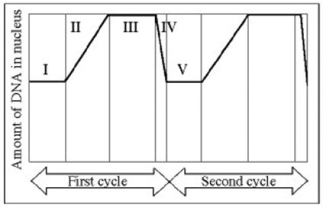
In the figure, at which of the numbered regions would you expect to find cells at metaphase?
A)II and IV
B)II only
C)III only
D)IV only

In the figure, at which of the numbered regions would you expect to find cells at metaphase?
A)II and IV
B)II only
C)III only
D)IV only

Unlock Deck
Unlock for access to all 66 flashcards in this deck.
Unlock Deck
k this deck
29
Use the figure to answer the question below.
The unlettered circle at the top of the figure shows a diploid nucleus with four chromosomes that have not yet replicated. There are two pairs of homologous chromosomes, one long and the other short. One haploid set is black, and the other is gray. The circles labeled A to E show various combinations of these chromosomes.
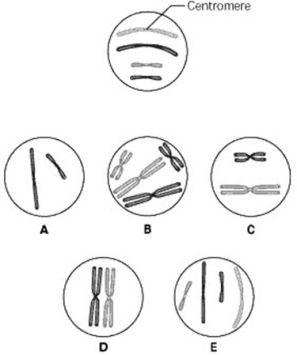
What is the correct chromosomal condition at prometaphase of mitosis?
A) B
B) C
C) D
D) E
The unlettered circle at the top of the figure shows a diploid nucleus with four chromosomes that have not yet replicated. There are two pairs of homologous chromosomes, one long and the other short. One haploid set is black, and the other is gray. The circles labeled A to E show various combinations of these chromosomes.

What is the correct chromosomal condition at prometaphase of mitosis?
A) B
B) C
C) D
D) E

Unlock Deck
Unlock for access to all 66 flashcards in this deck.
Unlock Deck
k this deck
30
The drug cytochalasin B blocks the function of actin. Which of the following aspects of the animal cell cycle would be most disrupted by cytochalasin B?
A) spindle formation
B) spindle attachment to kinetochores
C) movement of chromosomes to the poles during anaphase
D) cleavage furrow formation and cytokinesis
A) spindle formation
B) spindle attachment to kinetochores
C) movement of chromosomes to the poles during anaphase
D) cleavage furrow formation and cytokinesis

Unlock Deck
Unlock for access to all 66 flashcards in this deck.
Unlock Deck
k this deck
31
Use the figure to answer the question below.
The unlettered circle at the top of the figure shows a diploid nucleus with four chromosomes that have not yet replicated. There are two pairs of homologous chromosomes, one long and the other short. One haploid set is black, and the other is gray. The circles labeled A to E show various combinations of these chromosomes.
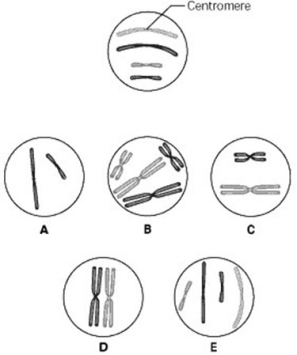
What is the correct chromosomal condition for one daughter nucleus at telophase of mitosis?
A) B
B) C
C) D
D) E
The unlettered circle at the top of the figure shows a diploid nucleus with four chromosomes that have not yet replicated. There are two pairs of homologous chromosomes, one long and the other short. One haploid set is black, and the other is gray. The circles labeled A to E show various combinations of these chromosomes.

What is the correct chromosomal condition for one daughter nucleus at telophase of mitosis?
A) B
B) C
C) D
D) E

Unlock Deck
Unlock for access to all 66 flashcards in this deck.
Unlock Deck
k this deck
32
Use the figure to answer the question below.
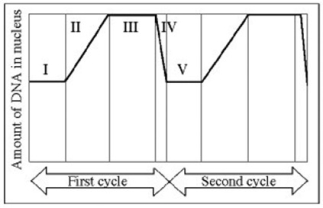
In the figure, G₁ is represented by which numbered part(s)of the cycle?
A)I and V
B)II
C)III
D)IV

In the figure, G₁ is represented by which numbered part(s)of the cycle?
A)I and V
B)II
C)III
D)IV

Unlock Deck
Unlock for access to all 66 flashcards in this deck.
Unlock Deck
k this deck
33
Nucleotides can be radiolabeled before they are incorporated into newly forming DNA and, therefore, can be assayed to track their incorporation. In a set of experiments, a student-faculty research team used labeled T nucleotides to study the incorporation of labeled nucleotides into a culture of lymphocytes. They found that the lymphocytes incorporated the labeled nucleotide at a significantly higher level after a pathogen was introduced into the culture. What might they conclude from this observation?
A) The pathogen consumed radiolabeled nucleotides.
B) Infection causes lymphocytes to divide more rapidly.
C) Infection causes lymphocytes to increase in size.
D) Infection causes lymphocyte cultures to skip some parts of the cell cycle.
A) The pathogen consumed radiolabeled nucleotides.
B) Infection causes lymphocytes to divide more rapidly.
C) Infection causes lymphocytes to increase in size.
D) Infection causes lymphocyte cultures to skip some parts of the cell cycle.

Unlock Deck
Unlock for access to all 66 flashcards in this deck.
Unlock Deck
k this deck
34
Use the figure to answer the question below.
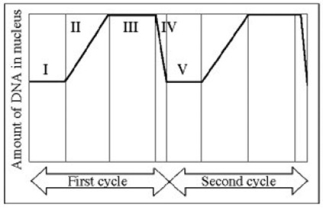
In the figure, which number represents DNA synthesis?
A)I
B)II
C)III
D)IV

In the figure, which number represents DNA synthesis?
A)I
B)II
C)III
D)IV

Unlock Deck
Unlock for access to all 66 flashcards in this deck.
Unlock Deck
k this deck
35
Use the figure to answer the question below.
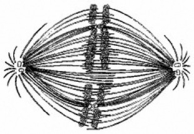
If the cell whose nuclear material is shown in the figure continues toward completion of mitosis, which of the following events would occur next?
A) spindle fiber formation
B) nuclear envelope breakdown
C) formation of telophase nuclei
D) synthesis of chromatids

If the cell whose nuclear material is shown in the figure continues toward completion of mitosis, which of the following events would occur next?
A) spindle fiber formation
B) nuclear envelope breakdown
C) formation of telophase nuclei
D) synthesis of chromatids

Unlock Deck
Unlock for access to all 66 flashcards in this deck.
Unlock Deck
k this deck
36
Through a microscope, you can see a cell plate beginning to develop across the middle of a cell and nuclei forming on either side of the cell plate. This cell is most likely ________.
A) an animal cell in the process of cytokinesis
B) an animal cell in anaphase of mitosis
C) a plant cell in the process of cytokinesis
D) a plant cell in metaphase of mitosis
A) an animal cell in the process of cytokinesis
B) an animal cell in anaphase of mitosis
C) a plant cell in the process of cytokinesis
D) a plant cell in metaphase of mitosis

Unlock Deck
Unlock for access to all 66 flashcards in this deck.
Unlock Deck
k this deck
37
A group of cells is assayed for DNA content immediately following mitosis and is found to have an average of 8 picograms of DNA per nucleus. How many picograms of DNA would be found in a nucleus at prophase of mitosis?
A) 4
B) 8
C) 16
D) 24
A) 4
B) 8
C) 16
D) 24

Unlock Deck
Unlock for access to all 66 flashcards in this deck.
Unlock Deck
k this deck
38
Several organisms, primarily protists, have what are called intermediate mitotic organization. What is the most probable hypothesis about these intermediate forms of cell division?
A) They represent a form of cell reproduction that must have evolved completely separately from those of other organisms.
B) They rely on totally different proteins for the processes they undergo.
C) They may be more closely related to plant forms that also have unusual mitosis.
D) They show some but not all of the evolutionary steps toward complete mitosis.
A) They represent a form of cell reproduction that must have evolved completely separately from those of other organisms.
B) They rely on totally different proteins for the processes they undergo.
C) They may be more closely related to plant forms that also have unusual mitosis.
D) They show some but not all of the evolutionary steps toward complete mitosis.

Unlock Deck
Unlock for access to all 66 flashcards in this deck.
Unlock Deck
k this deck
39
Which of the following events occurs during interphase of the cell cycle?
A) condensation of the chromosomes
B) separation of the spindle poles
C) spindle formation
D) replication of the DNA
A) condensation of the chromosomes
B) separation of the spindle poles
C) spindle formation
D) replication of the DNA

Unlock Deck
Unlock for access to all 66 flashcards in this deck.
Unlock Deck
k this deck
40
Nucleotides can be radiolabeled before they are incorporated into newly synthesized DNA and, therefore, can be assayed to track their incorporation. In a set of experiments, a student-faculty research team used labeled T nucleotides and introduced these into a culture of dividing human cells at specific times. Which of the following questions might be answered by using the method described?
A) How many cells are produced by the culture per hour?
B) What is the length of the S phase of the cell cycle?
C) How many picograms of DNA are made per cell cycle?
D) When do spindle fibers attach to chromosomes?
A) How many cells are produced by the culture per hour?
B) What is the length of the S phase of the cell cycle?
C) How many picograms of DNA are made per cell cycle?
D) When do spindle fibers attach to chromosomes?

Unlock Deck
Unlock for access to all 66 flashcards in this deck.
Unlock Deck
k this deck
41
Early observations of a cultured cell line indicated that the cells did not exhibit either density-dependent inhibition or anchorage dependence. What do these observations suggest about this cell line?
A) The cells are unable to form spindle microtubules.
B) The cells follow an altered series of cell cycle phases.
C) The cells show characteristics of tumors.
D) The cells have nonfunctional MPF.
A) The cells are unable to form spindle microtubules.
B) The cells follow an altered series of cell cycle phases.
C) The cells show characteristics of tumors.
D) The cells have nonfunctional MPF.

Unlock Deck
Unlock for access to all 66 flashcards in this deck.
Unlock Deck
k this deck
42
Why do neurons and some other specialized cells divide infrequently?
A) They no longer have active nuclei.
B) They have entered into G₀.
C) They can no longer degrade cyclins.
D) They no longer produce MPF.
A) They no longer have active nuclei.
B) They have entered into G₀.
C) They can no longer degrade cyclins.
D) They no longer produce MPF.

Unlock Deck
Unlock for access to all 66 flashcards in this deck.
Unlock Deck
k this deck
43
What would you expect to happen if MPF (maturation-promoting factor)is introduced into immature frog oocytes that are arrested in G₂?
A) The cells would remain arrested in G₂.
B) The cells would enter G₀.
C) The cells would enter mitosis.
D) The cells would begin DNA synthesis.
A) The cells would remain arrested in G₂.
B) The cells would enter G₀.
C) The cells would enter mitosis.
D) The cells would begin DNA synthesis.

Unlock Deck
Unlock for access to all 66 flashcards in this deck.
Unlock Deck
k this deck
44
Once a cell enters mitosis, the molecules that activate division must be turned off. What happens to MPF during mitosis?
A) It is completely degraded.
B) It is phosphorylated by a Cdk, which inactivates it.
C) The cyclin component of MPF is degraded.
D) The Cdk component of MPF is degraded.
A) It is completely degraded.
B) It is phosphorylated by a Cdk, which inactivates it.
C) The cyclin component of MPF is degraded.
D) The Cdk component of MPF is degraded.

Unlock Deck
Unlock for access to all 66 flashcards in this deck.
Unlock Deck
k this deck
45
Which of the following molecules is released by platelets in the vicinity of an injury?
A) PDGF
B) MPF
C) cyclin
D) Cdk
A) PDGF
B) MPF
C) cyclin
D) Cdk

Unlock Deck
Unlock for access to all 66 flashcards in this deck.
Unlock Deck
k this deck
46
At what stage of the cell cycle is the cyclin component of MPF destroyed?
A) in late G₁
B) at mid-S phase
C) in early G₂
D) in late M
A) in late G₁
B) at mid-S phase
C) in early G₂
D) in late M

Unlock Deck
Unlock for access to all 66 flashcards in this deck.
Unlock Deck
k this deck
47
Cells from advanced malignant tumors often have very abnormal chromosomes and an abnormal number of chromosomes. What might explain the association between malignant tumors and chromosomal abnormalities?
A) Cancer cells are no longer density-dependent.
B) Cancer cells are no longer anchorage-dependent.
C) Cell cycle checkpoints are not in place to stop cells with chromosome abnormalities.
D) Transformation introduces new chromosomes into cells.
A) Cancer cells are no longer density-dependent.
B) Cancer cells are no longer anchorage-dependent.
C) Cell cycle checkpoints are not in place to stop cells with chromosome abnormalities.
D) Transformation introduces new chromosomes into cells.

Unlock Deck
Unlock for access to all 66 flashcards in this deck.
Unlock Deck
k this deck
48
Which of the following properties is associated with a cyclin-dependent kinase (Cdk)?
A) A Cdk is inactive, or "turned off," in the presence of a cyclin.
B) The number of Cdk molecules increases during the S and G₂ phases and decrease during M.
C) A Cdk is an enzyme that catalyzes the attachment of kinetochores to microtubules.
D) A Cdk is an enzyme that attaches phosphate groups to other proteins.
A) A Cdk is inactive, or "turned off," in the presence of a cyclin.
B) The number of Cdk molecules increases during the S and G₂ phases and decrease during M.
C) A Cdk is an enzyme that catalyzes the attachment of kinetochores to microtubules.
D) A Cdk is an enzyme that attaches phosphate groups to other proteins.

Unlock Deck
Unlock for access to all 66 flashcards in this deck.
Unlock Deck
k this deck
49
Which of the following molecules is a protein synthesized at specific times during the cell cycle that associates with a kinase to form a catalytically active complex?
A) PDGF
B) MPF
C) cyclin
D) Cdk
A) PDGF
B) MPF
C) cyclin
D) Cdk

Unlock Deck
Unlock for access to all 66 flashcards in this deck.
Unlock Deck
k this deck
50
Which of the following molecules triggers the cell's passage past the G₂ checkpoint into mitosis?
A) PDGF
B) MPF
C) cyclin
D) Cdk
A) PDGF
B) MPF
C) cyclin
D) Cdk

Unlock Deck
Unlock for access to all 66 flashcards in this deck.
Unlock Deck
k this deck
51
Exposure of zebrafish nuclei to cytosol isolated from eggs at metaphase of mitosis resulted in phosphorylation of NEP55 and L68 proteins by cyclin-dependent kinase 2. NEP55 is a protein of the inner nuclear membrane, and L68 is a protein of the nuclear lamina. What is the most likely role of phosphorylation of these proteins in the process of mitosis?
A) They enable the attachment of the spindle microtubules to kinetochore regions of the centromere.
B) They are involved in chromosome condensation.
C) They are involved in the disassembly of the nuclear envelope.
D) They assist in the migration of centrosomes to opposite sides of the nucleus.
A) They enable the attachment of the spindle microtubules to kinetochore regions of the centromere.
B) They are involved in chromosome condensation.
C) They are involved in the disassembly of the nuclear envelope.
D) They assist in the migration of centrosomes to opposite sides of the nucleus.

Unlock Deck
Unlock for access to all 66 flashcards in this deck.
Unlock Deck
k this deck
52
Through a microscope, you can see a cell plate beginning to develop across the middle of a cell and nuclei forming on either side of the cell plate. This cell is most likely
A) an animal cell in the process of cytokinesis.
B) a plant cell in the process of cytokinesis.
C) a bacterial cell dividing.
D) a plant cell in metaphase.
A) an animal cell in the process of cytokinesis.
B) a plant cell in the process of cytokinesis.
C) a bacterial cell dividing.
D) a plant cell in metaphase.

Unlock Deck
Unlock for access to all 66 flashcards in this deck.
Unlock Deck
k this deck
53
Besides the ability of some cancer cells to over proliferate, which of the following situations might logically result in a tumor?
A) changes in the order of cell cycle stages
B) lack of appropriate cell death
C) inability to form spindles
D) failure of cells to enter S phase
A) changes in the order of cell cycle stages
B) lack of appropriate cell death
C) inability to form spindles
D) failure of cells to enter S phase

Unlock Deck
Unlock for access to all 66 flashcards in this deck.
Unlock Deck
k this deck
54
The M phase checkpoint ensures that all chromosomes are attached to the mitotic spindle. If this does not happen, cells would most likely be arrested in ________.
A) telophase
B) prophase
C) G₂
D) metaphase
A) telophase
B) prophase
C) G₂
D) metaphase

Unlock Deck
Unlock for access to all 66 flashcards in this deck.
Unlock Deck
k this deck
55
Use the figure to answer the question below.
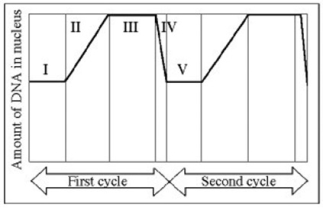
In the figure, MPF reaches its highest concentration during this stage.
A) I
B) II
C) III
D) IV

In the figure, MPF reaches its highest concentration during this stage.
A) I
B) II
C) III
D) IV

Unlock Deck
Unlock for access to all 66 flashcards in this deck.
Unlock Deck
k this deck
56
Density-dependent inhibition is explained by which of the following processes?
A) As cells become more numerous, they begin to squeeze against each other, restricting their size.
B) As cells become more numerous, the cell surface proteins of one cell contact the adjoining cells, and they signal each other to stop dividing.
C) As cells become more numerous, the protein kinases they produce begin to compete with each other, such that the proteins produced by one cell essentially cancel those produced by its neighbor.
D) As cells become more numerous, the level of waste products increases, which slows metabolism and inhibits growth.
A) As cells become more numerous, they begin to squeeze against each other, restricting their size.
B) As cells become more numerous, the cell surface proteins of one cell contact the adjoining cells, and they signal each other to stop dividing.
C) As cells become more numerous, the protein kinases they produce begin to compete with each other, such that the proteins produced by one cell essentially cancel those produced by its neighbor.
D) As cells become more numerous, the level of waste products increases, which slows metabolism and inhibits growth.

Unlock Deck
Unlock for access to all 66 flashcards in this deck.
Unlock Deck
k this deck
57
Which of the following molecules is a protein maintained at steady levels throughout the cell cycle that requires cyclin to become catalytically active?
A) PDGF
B) MPF
C) cyclin
D) Cdk
A) PDGF
B) MPF
C) cyclin
D) Cdk

Unlock Deck
Unlock for access to all 66 flashcards in this deck.
Unlock Deck
k this deck
58
For a chemotherapeutic drug to be useful for treating cancer cells, which of the following characteristics is most desirable?
A) It is safe enough to prevent all apoptosis.
B) It does not interfere with metabolically active cells.
C) It specifically inhibits cells entering G₀.
D) It specifically inhibits rapidly dividing cells.
A) It is safe enough to prevent all apoptosis.
B) It does not interfere with metabolically active cells.
C) It specifically inhibits cells entering G₀.
D) It specifically inhibits rapidly dividing cells.

Unlock Deck
Unlock for access to all 66 flashcards in this deck.
Unlock Deck
k this deck
59
What two components constitute an active MPF?
A) a growth factor and mitotic factor
B) ATP synthetase and a protease
C) cyclin and tubulin
D) cyclin and a cyclin-dependent kinase
A) a growth factor and mitotic factor
B) ATP synthetase and a protease
C) cyclin and tubulin
D) cyclin and a cyclin-dependent kinase

Unlock Deck
Unlock for access to all 66 flashcards in this deck.
Unlock Deck
k this deck
60
Vinblastine is a standard chemotherapeutic drug used to treat cancer. Because it interferes with the assembly of microtubules, its effectiveness must be related to
A) disruption of mitotic spindle formation.
B) suppression of cyclin production.
C) myosin denaturation and inhibition of cleavage furrow formation.
D) inhibition of DNA synthesis.
A) disruption of mitotic spindle formation.
B) suppression of cyclin production.
C) myosin denaturation and inhibition of cleavage furrow formation.
D) inhibition of DNA synthesis.

Unlock Deck
Unlock for access to all 66 flashcards in this deck.
Unlock Deck
k this deck
61
The decline of MPF activity at the end of mitosis is due to
A) the destruction of the protein kinase Cdk.
B) decreased synthesis of Cdk.
C) the degradation of cyclin.
D) the accumulation of cyclin.
A) the destruction of the protein kinase Cdk.
B) decreased synthesis of Cdk.
C) the degradation of cyclin.
D) the accumulation of cyclin.

Unlock Deck
Unlock for access to all 66 flashcards in this deck.
Unlock Deck
k this deck
62
Which of the following does not occur during mitosis?
A) condensation of the chromosomes
B) replication of the DNA
C) separation of sister chromatids
D) spindle formation
A) condensation of the chromosomes
B) replication of the DNA
C) separation of sister chromatids
D) spindle formation

Unlock Deck
Unlock for access to all 66 flashcards in this deck.
Unlock Deck
k this deck
63
The drug cytochalasin B blocks the function of actin. Which of the following aspects of the animal cell cycle would be most disrupted by cytochalasin B?
A) spindle formation
B) spindle attachment to kinetochores
C) cell elongation during anaphase
D) cleavage furrow formation and cytokinesis
A) spindle formation
B) spindle attachment to kinetochores
C) cell elongation during anaphase
D) cleavage furrow formation and cytokinesis

Unlock Deck
Unlock for access to all 66 flashcards in this deck.
Unlock Deck
k this deck
64
Cell A has half as much DNA as cells B, C, and D in a mitotically active tissue. Cell A is most likely in
A) G₁.
B) G₂.
C) prophase.
D) metaphase.
A) G₁.
B) G₂.
C) prophase.
D) metaphase.

Unlock Deck
Unlock for access to all 66 flashcards in this deck.
Unlock Deck
k this deck
65
In the cells of some organisms, mitosis occurs without cytokinesis. This will result in
A) cells with more than one nucleus.
B) cells that are unusually small.
C) cells lacking nuclei.
D) cell cycles lacking an S phase.
A) cells with more than one nucleus.
B) cells that are unusually small.
C) cells lacking nuclei.
D) cell cycles lacking an S phase.

Unlock Deck
Unlock for access to all 66 flashcards in this deck.
Unlock Deck
k this deck
66
One difference between cancer cells and normal cells is that cancer cells
A) are unable to synthesize DNA.
B) are arrested at the S phase of the cell cycle.
C) continue to divide even when they are tightly packed together.
D) cannot function properly because they are affected by density-dependent inhibition.
A) are unable to synthesize DNA.
B) are arrested at the S phase of the cell cycle.
C) continue to divide even when they are tightly packed together.
D) cannot function properly because they are affected by density-dependent inhibition.

Unlock Deck
Unlock for access to all 66 flashcards in this deck.
Unlock Deck
k this deck



